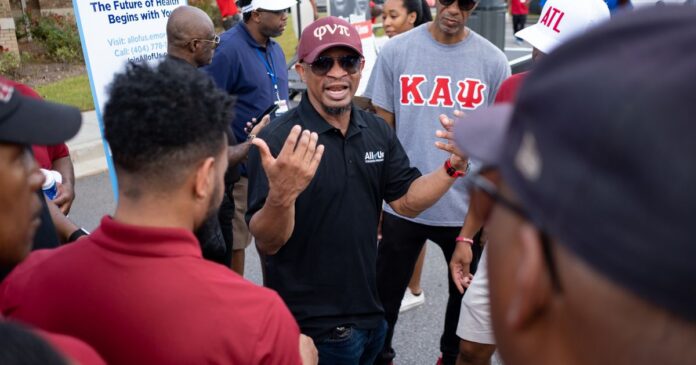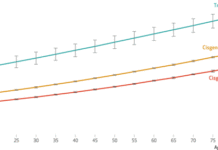
The American Red Cross and the so-called “Divine Nine” group of national Black fraternities and sororities helped organize the event at Friendship Baptist to get members to donate blood for people with sickle cell disease. The hereditary red blood cell condition, which primarily affects Black people, can cause pain, strokes and even death.
Martez explained the “All of Us” research project to Willingham, 24, and two other young men after hearing speeches about living with sickle cell disease and depending on donated blood for survival.
“Medical research is like glasses,” he told them, pointing to his own. “You can’t have one size fits all.”
Willingham, a Clark Atlanta graduate, said he was drawn to the event because he had childhood friends who suffered from sickle cell disease. When Martez told him about “All of Us,” he thought, “anything that can get medical attention to underrepresented communities is a good thing.” Plus, he said, “if the Divine Nine supports it, I support it.”
Standing nearby was Smyther Fallen, 32, an entrepreneur and Atlanta native who also had signed up. He said he was “open to jump into the program, as long I have time for it.” Both said they trusted their fraternity to be promoting something positive.
The event’s location — a neighborhood church — and the partnership with historically Black organizations provide a model for how to do health care outreach in marginalized communities, said Dr. Karriem Watson, chief engagement officer for the project.
At the same time, he said, even being at the right place and working with the right messengers doesn’t guarantee that people from underrepresented populations will join the project, given the history of exclusion and even harm seen in medicine and health care. “We have to acknowledge the historical ills, and keep reminding people that medical research is changing,” Watson said.
Emory University partners were also at the sickle cell event event to show Fallen and Willingham how to sign up for “All of Us,” enter basic information into the database and choose a level of participation. This can include uploading health records, filling out health-related surveys and sending in or giving in-person blood or tissue samples.
Not all participants get to the last step. The program announced earlier this year that it had gathered a genomic database from nearly 100,000 people, about half of whom were from underrepresented groups. At the time, Dr. Josh Denny, the program’s chief executive officer, lauded the milestone, saying “…over 90% of participants from large genomics studies have been of European descent. The lack of diversity in research has hindered scientific discovery.”
Having medical information on hand from hundreds of thousands of people of diverse backgrounds, ages and genders can help with other kinds of research studies as well. Dr. Alvaro Alonso, an epidemiologist and professor at Emory University’s Rollins School of Public Health, has surveyed the frequency of atrial fibrillation in different populations.
Alonso said he chose this relatively simple study to “test” the database and see if it replicated previous study results showing what populations were most affected by the heart condition. It did. “We achieved the initial goal of seeing that data from ‘All of Us’ can be useful,” he said.
Alonso said the study is different from previous surveys because of the population included in the database. “Not including diverse populations makes results less generalizable, less reliable,” he said.
Other studies at Emory and elsewhere are starting to use “All of Us” information “to address the social determinants of health, how racism affects health outcomes, and so on,” Alonso said.
At Friendship Baptist, Fallen said he felt like he had just “started something great.”
“Even though you might not be in the lab,” he said, “to be a part of something that may help another person — it could change the world.”
For more information, including how to join “All of Us,” see: https://www.joinallofus.org/.
The Atlanta Journal-Constitution and Report for America are partnering to add more journalists to cover topics important to our community. Please help us fund this important work at ajc.com/give








